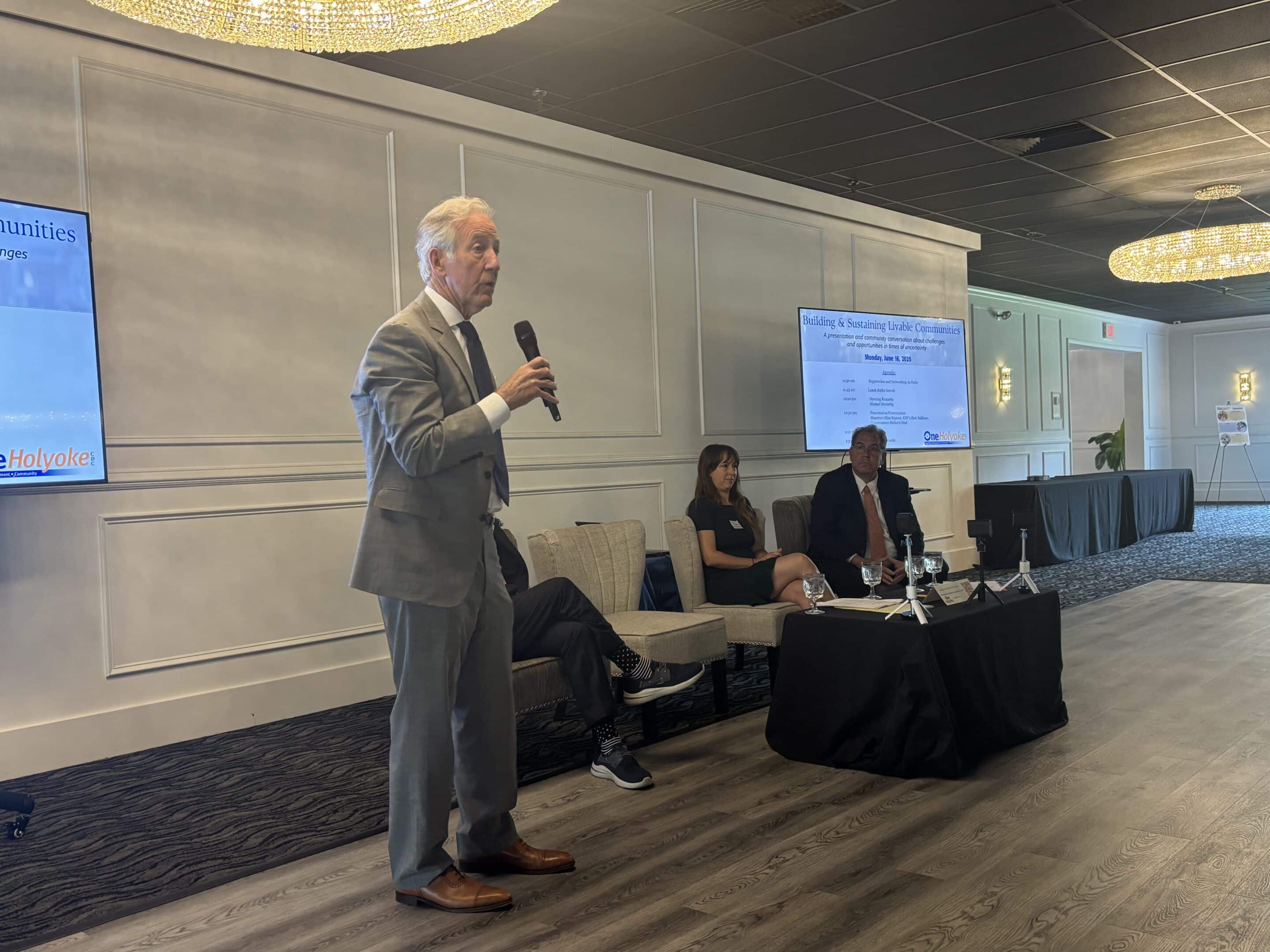U.S. Rep. Richard Neal talks to the audience about problems Americans may be facing during the Building and Sustaining Livable Communities event.
Reminder Publishing photo by Tyler Garnet
HOLYOKE — OneHolyoke CDC hosted a lunchtime event, “Building and Sustaining Livable Communities,” on June 16, featuring speakers U.S. Rep. Richard Neal, Rick Sullivan and Elise Rapoza, to discuss and address the housing crisis.
With looming federal cutbacks and economic uncertainty, the lunch event included presentations on challenges and opportunities for gateway cities and offered an opportunity for the various nonprofits and organizations to network and ask questions.
Founded in 1971, OneHolyoke CDC has created over 160 new homes in the Flats, Churchill and South Holyoke neighborhoods, rehabilitated hundreds of apartments and provided thousands of home improvement grants to homeowners through the Neighborhood Improvement Program.
The moderator was Michael Moriarty, OneHolyoke CDC executive director, who aimed to begin a conversation around how resources, innovation, advocacy and collaboration all play a role in weathering the current instability of federal cutbacks and other related uncertainties affecting gateway cities and other communities.
Moriarty stated, “We have three very prominent people in our state and our community here who, for different reasons, and in different ways, really have their thumb on what’s going on but here’s our dilemma, there is a profound housing crisis that has been longstanding and getting worse. As a community development corporation, as part of the housing community, the building community in Holyoke, we need to answer the call.”
Neal, a Springfield Democrat and ranking member of the U.S. House Ways and Means committee, offered a perspective from the federal level.
He discussed other issues that residents may be facing including cuts to social security, Medicare and Medicaid, but mentioned that by working together, people can help find solutions.
Neal said, “I hope as you examine the role that nonprofits play, you’ll remind people of how important it is in American life every day. I think the other thing we can say with some certainty is you’re not getting rich doing it, but your role is vital. You care for those who often times can’t care for themselves.”
Sullivan, president and CEO of the Economic Development Council of Western Massachusetts, offered a perspective from the business community.
He mentioned that Western Massachusetts has seen cuts before at the state and federal level, but Western Massachusetts also has great partnerships to close the gap and turn problems into opportunities.
He said, “It’s an opportunity to come out stronger and better on the other side. I think there’s an opportunity to come out stronger on the other side if we’re all working together. I’d like to look at it as an economic development opportunity because it’s a growth opportunity and we have not had this big of a growth opportunity in our region at least for the three decades that I’ve been involved in government.”
Rapoza, senior research associate at MassINC Policy Center, provided a viewpoint as a public policy expert, presenting her report on Fostering Mixed-Income Neighborhoods to Close the Economic Divide.
The presentation by Rapoza showed that 1,098 housing units could be added by returning long-term vacant units to the market in gateway cities but explained, “the problem that gateway cities face is that the cost construction far out exceeds the amount of rental income or poor sale that one could count on over a fixed amount of time to justify the construction costs.”
As a result, gateway cities like Holyoke are heavily dependent on public subsidies to bring down the cost of construction.
Rapoza said someone looked historically at the vacancy rates to see how many vacant units are needed to minimize competition and stabilize prices over time to keep pace with inflation.
In Holyoke, the rental vacancy rate is 3.8% which is below the 7.4% that’s needed. Rapoza explained, “The more competition there is between renters and buyers, the more that person who owns that unit can justify charging because you’re going to get into a bidding war.”
Mass Inc. also created a website that provides statistics and tracks housing market condition in gateway cities. Readers can find the resource at massinc.org.
Rapoza said, “It’s a nice little interactive tool where you can get a profile for whichever of the 26 gateway cities, you’re interested in.”



